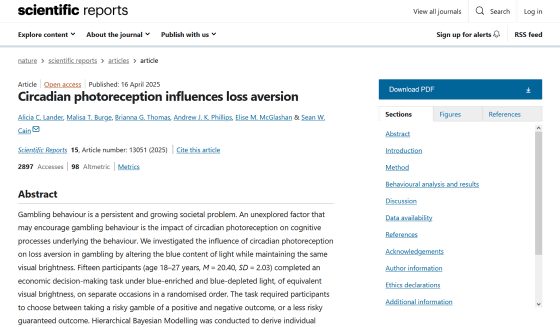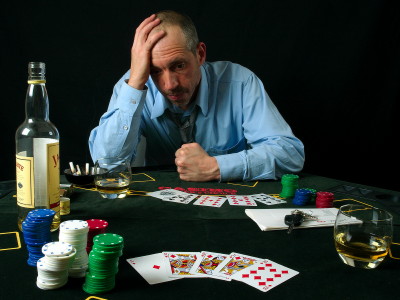The color of casino lighting may influence gamblers' brains to make high-risk bets

Circadian photoreception influences loss aversion | Scientific Reports
https://www.nature.com/articles/s41598-025-97370-z

Could lighting be the new gambling regulator? – News
https://news.flinders.edu.au/blog/2025/06/04/could-lighting-be-the-new-gambling-regulator/
Casino Lights Could Be Warping Your Brain to Take Risks, Scientists Warn : ScienceAlert
https://www.sciencealert.com/casino-lights-could-be-warping-your-brain-to-take-risks-scientists-warn
According to the research team, about 1.6 billion people worldwide gamble in some form, and with the spread of smartphones and PCs, the number of people gambling online at casinos and on sports via the Internet is rapidly increasing. There are many factors that drive people to gamble, but the loud noises and lights from slot machines, as well as the lighting in gambling halls, may also affect people's gambling behavior.
A research team from Monash University and Flinders University in Australia hypothesized that the 'blue light' found in LEDs and casino lighting may affect the brain and induce gambling.
The research team gathered 15 volunteers aged 18 to 27 years old and had them complete a task in both a room with a lot of blue light and a room with reduced blue light. The task imitated gambling, and subjects were asked to choose between a risky but high-reward bet or a low-risk, low-reward bet. The subjects were told in advance that they would receive a $20 reward depending on their results.
The rooms in which the subjects performed the task are shown below. The left is a 'room with a lot of blue light', and the right is a 'room with reduced blue light.' The amount of blue light in the two rooms was different, but the brightness was constant in both.

The results showed that participants were significantly less loss-averse and more likely to choose risky bets over safer options when they completed the task in a room enriched with blue light. Men were also more likely to take risky bets than women, which is consistent with
Lead author Dr Alicia Lander from Flinders University said: 'In conditions with low blue light, people perceived a $100 loss as much stronger than a $100 gain - the loss was simply perceived as bad. But in an environment with plenty of bright blue light, like that found in casino machines, the $100 loss didn't seem so bad and people were more willing to take risks.'
The results of this study suggest that blue light may alter neural processing in brain regions related to reward and decision-making, and may suppress negative emotions associated with losses. Therefore, regulating blue light in casinos, slot machines, and online casino platforms may reduce impulsive gambling.
'Blue light reduces cognitive sensitivity to loss, which may lead people to judge risk and reward less accurately,' said Professor Sean Cain , from the Flinders University Health and Medical Research Institute (FHMRI) . 'Simply making casino lighting less blue could help promote safer gambling behaviour.'

Related Posts:
in Science, Posted by log1h_ik







